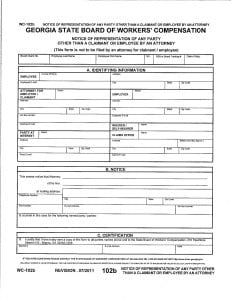Idiopathic is a strange word. It means a condition that arises spontaneously from an unknown cause. If you have a workers’ compensation case, you may first hear this word on a Form WC-1, Form WC-3, or a letter from the insurance company. That document will probably have a statement that the insurance company has denied your case on the basis that your injury was “idiopathic” or “did not arise out of your employment”.
I wrote a previous article that discussed “arising out of employment” in detail, but that article did not really focus on true “idiopathic” accidents and injuries.
 A real idiopathic injury is not work related
A real idiopathic injury is not work related
Georgia workers’ compensation law usually does not cover a true idiopathic accident because it is not work related. An example would be an employee with epilepsy who has an epileptic seizure. Suppose the seizure causes him to fall down on the ground and break his arm.
Generally, the broken arm is not covered by workers’ compensation because the fall was not caused by the job. A personal condition caused the fall and this injury. The same sort of rule would apply if the employee passed out or had a stroke or heart attack (assuming the stroke or heart attack was not connected to the employment in any way).
Accidents connected to work are not idiopathic
The first question to ask is whether the condition that occurred was truly idiopathic. If the job caused the fall in some way, then workers’ compensation should cover the injury. Examples of this situation include seizures, strokes, or heart attacks caused by physical or mental stress associated with the job.
Even when the accident is “idiopathic”, the injury might not be
If the cause of the fall is truly “idiopathic”, the injury may still be covered under workers’ compensation if something about the event is work related. For example, if the employee fell onto some equipment that was connected with the employee’s work, the injury would probably be covered. This type of situation usually occurs when someone passes out and hits a desk, chair, or table. It also occurs when the employee works at heights and falls because the injury would not have happened if the employee had not fallen so far. This situation comes up with falls from ladders, stairs, scaffolding, and other work activities done at heights.
Should I fight the idiopathic defense?
The important thing to understand is that you should not give up on your case if you receive a form from the workers’ compensation insurance company denying your injury as “idiopathic”. Many times, you can fight this denial and win your case. You may have to go to court to do so.
Because of that, your first step should probably be to get a free consultation with an attorney who specializes in workers’ compensation cases. Just read this short article to find out more about what a free consultation is. Then, just let me know if you would like to schedule one.









